“Brush your teeth twice a day, every day, for at least two minutes!” We have all heard this phrase time and time again when going to the dentist, and currently, the American Dental Association (ADA) states this as their official advice on toothbrushing. But let’s be honest: At the end of the long day, or when just waking up in the morning, brushing your teeth can feel like a bothersome chore. Standing there for a full two minutes and making sure to brush with the right technique can feel pretty annoying. So why do dentists recommend it so highly, and what are the consequences if you don’t follow their tooth brushing advice?
Believe it or not, your teeth are actually complex, vibrant structures that play a much larger role than simply chomping down on your food (although that’s also super important!). According to Same Day Dental, the placement of your teeth actually helps your jawbone stay in the right shape and place. Also, your teeth help you be able to speak clearly (via Physiology, Tooth). They even exchange minerals that your cells need, similar to other bones in the body! Taking care of your pearly whites allows you to take care of your whole body. So let’s dive into what exactly is going on when you brush your teeth as often as you should.
You’ll keep bacterial proliferation and inflammation under control
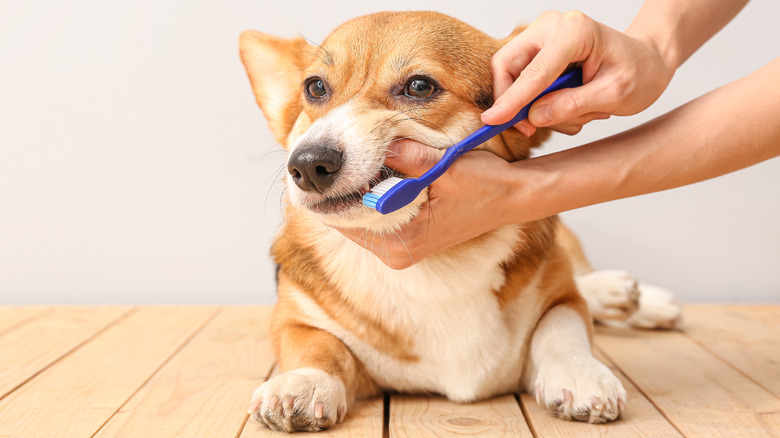
Exposure to food particles can give bacteria access to our teeth, and leftover sugar molecules from food feed these bacteria (via Mouth Healthy). It doesn’t take long for these bacteria to build a sticky substance called plaque. Left unattended, the bacteria in plaque can cause inflammation and oral bacterial infections, including cavities and gingivitis (via Journal of Molecular Biology). Moreover, dental infections don’t just stay in your mouth. Scientists have identified a clear link between tooth decay with much more serious conditions, including diabetes, Alzheimer’s, heart disease, and even cancer (via Home Health Care Management & Practice). Unhealthy teeth can have massive consequences on your overall health.
The most efficient way to remove plaque and bacteria from your teeth is through daily brushing. According to the Mayo Clinic, when you brush your teeth twice daily every single day, you can get that gunky plaque off your teeth. Removing plaque daily helps keep dangerous bacteria from taking over your teeth, and resultantly helps reduce inflammation (via Journal of Clinical Periodontology). Taking care of inflammation and bacteria in your mouth decreases the chance that they will end up affecting some other part of your body. By brushing your teeth and taking care of your oral health, you can give your health a boost and help protect yourself from some very serious chronic conditions.
You’ll protect the structural integrity of your teeth
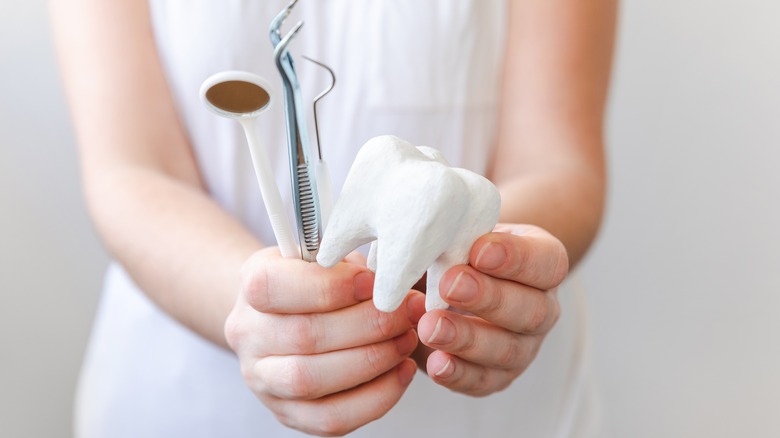
Your teeth are dynamic structures that have several intricate layers. The innermost layer of the tooth is the pulp. The pulp contains the nerves and blood vessels that keep the tooth alive and responsive (via WebMD). At the root of the tooth, we find a layer called cementum, which keeps the tooth firmly attached to the gums. The crown of the tooth, which is the pearly white part we see sticking out, has two more layers: dentin and enamel. Dentin is a hard connective tissue comprised of a vast network of microtubules. The rock-hard calcium enamel makes up the outermost layer of the crown.
You actually preserve the structural integrity when you brush your teeth, because you remove the plaque which can damage the enamel, causing cavities and even tooth decay (via Journal of Nobel Medical College). Tooth decay can often only be addressed with procedures like root canals (via National Health Service), and in very dire cases, total tooth extraction (via Colgate). Remember, our teeth don’t just chew our food. They also help hold the shape of the jaw. Removing teeth can compromise the overall bone integrity of the jaw, and removed teeth often need dental implants to replace them (via Same Day Dental). Ultimately, taking just four minutes a day to brush your teeth can help prevent some very costly, painful procedures and will help you keep your teeth (via ADA).
You’ll help protect against cavities
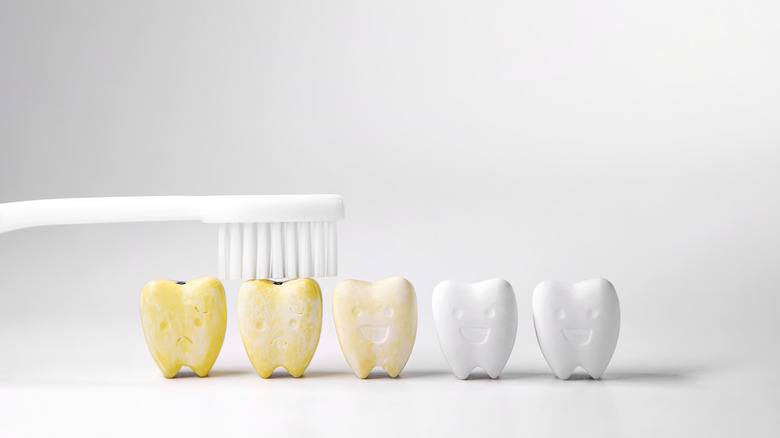
weeranuch/Shutterstock
The environment of the mouth functions as a dream vacation zone for various bacteria (via International Journal of Oral Science). A healthy mouth actually has several different species of bacteria growing together to create a thriving microbiome that helps produce substances that can digest food. However, when teeth are not brushed regularly, food particles and sugars will stay on your teeth, allowing certain species of harmful bacteria to get free reign over the teeth (via Mayo Clinic). They will then start producing plaque, and they will also release acids that lower the pH around the teeth. This becomes a vicious cycle, because generally, harmful bacteria found on teeth tend to grow better in an acidic environment.
If left unchecked, the acid produced by the bacteria on your teeth will eat through the enamel, opening holes called cavities (via Scientific Reports). Cavities are actually bacterial infections that most of the time can only be treated by thorough cleaning and filling (via International Journal of Oral Science). Brushing your teeth every day helps stop the cavity-forming process in its tracks, because you will continually scrub off the plaque that bacteria love to grow in.
You’ll maintain healthier gums
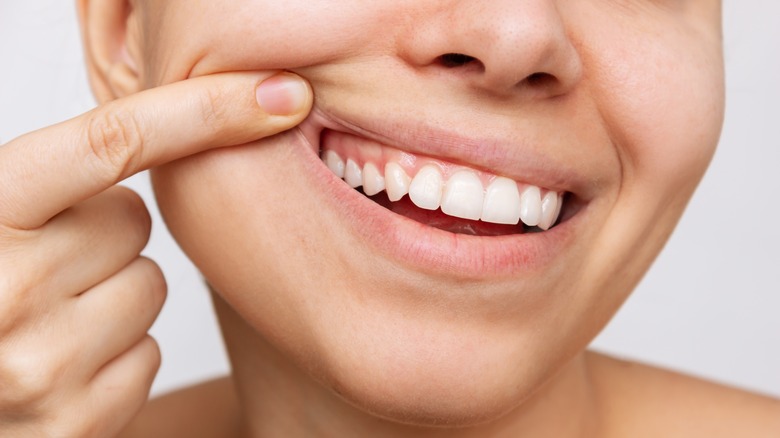
Marina Demeshko/Shutterstock
Plaque doesn’t just affect teeth. It also affects the soft pink gums that normally keep your teeth snugly in place. When plaque builds up around your gums, it causes gingivitis, which is a mild gum disease characterized by swollen and tender gums (via Colgate). People with gingivitis may also bleed from their gums very easily, as gums can be irritated by rough food particles and even gentle tooth brushing. A 2012 study published in the Journal of Dental Research estimates that over 45% of the U.S. adult population has some form of gingivitis, with over 8% suffering from severe gum disease. Gingivitis levels were higher among lower-income demographics that may not have access to proper dental care, as well as smokers.
Thankfully, people with gingivitis can take proactive steps to strengthen their gums. An article published by the Journal of Clinical Periodontology stated that a single 2-minute tooth brushing session can reduce plaque levels by 42% on average. This plaque reduction in turn can reduce gum inflammation, slowing down the progression of gingivitis. Ultimately, the most effective long-term way to manage and prevent gingivitis is regular tooth brushing (via Oral Health & Preventative Dentistry). However, before aggressively brushing your teeth to get that plaque scrubbed off, make sure you are using the right toothbrush for your gum situation (via Colgate). According to Colgate, people with more sensitive, inflamed gums may want to use a soft-bristled toothbrush to reduce irritation.
You’ll keep your breath fresh
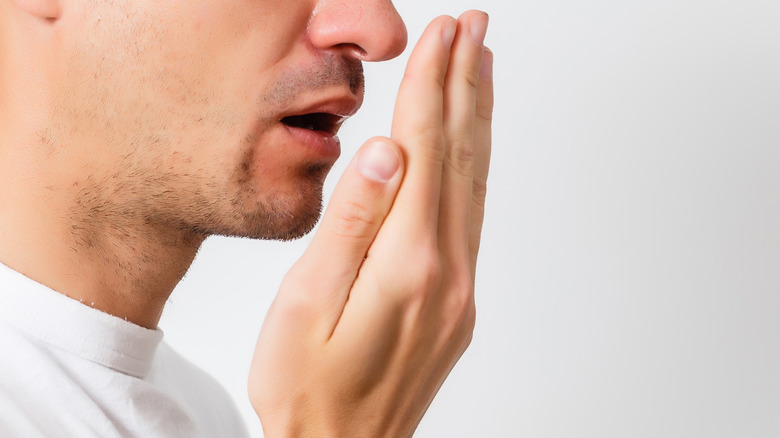
Andrew Angelov/Shutterstock
Bad breath can make even your closest friends take a step back. No one enjoys having bad breath, and definitely no one enjoys interacting with someone whose breath smells stale or like the food they just ate (garlic breath, anyone?). On a more serious note, Mouth Healthy states that chronic bad breath can indicate serious issues with both oral and overall systemic health.
Thankfully, regular tooth brushing once again proves to be a prime solution for controlling and eliminating bad breath. And it’s not just about the minty toothpaste smell leftover. According to Green Square Dental and Implant Center, the bacteria that grow from food particles in your mouth will start to produce compounds that release sulfur, a very stinky substance. Brushing off the food particles and plaque will intrinsically improve the smell of your breath.
For people who struggle with chronic bad breath, tooth brushing may function as part of a treatment plan to deal with the issue, although usually dentists and doctors need to resolve the underlying root cause before breath starts to consistently smell better. If chronic bad breath is a struggle for you, consider seeing your dentist to discuss what action steps you can take to resolve the problem and get fresher breath (via Mouth Healthy).
You’ll feel confident in your smile

Rido/Shutterstock
By removing plaque and tartar, protecting your gums, and minimizing bad breath through regular tooth brushing, you will automatically have a smile you are more confident in. One study examined the effect of good tooth brushing habits in children in Nigeria, and the researchers found that kids who brushed their teeth regularly had a 71% increase in smile confidence (via International Dental Journal).
And according to an article from Science Reporter, having and maintaining healthy teeth can increase a person’s overall confidence and wellbeing. Writers of the article also advise to use a gentle technique and brush, as this will prevent gum bleeding and inflammation, and will also not damage the enamel of the teeth. Teeth that are clean and brightly colored automatically look better and present an image of overall health and wellbeing. Proper, regular tooth brushing boosts your confidence, and will help you feel that you can show off your gorgeous smile.
You’ll prevent dangerous systemic bacterial infections
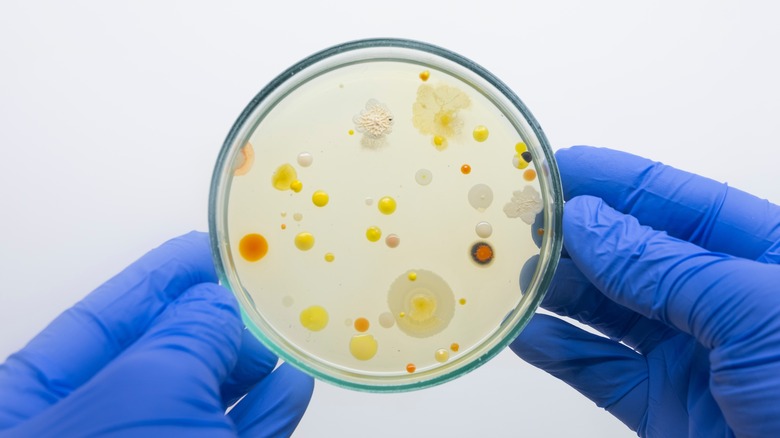
Prrrettty/Shutterstock
There are several bacterial infections caused by lack of dental hygiene and unbrushed teeth that can wreck havoc and even prove fatal. Gingivitis can turn into severe gum disease, or periodontitis if left untreated (via WebMD). Periodontitis causes the gums to get very swollen and draw away from the teeth, leading to tooth loss, especially in older adults. If ultimately left untreated, decayed gums and teeth can leech bacteria into the bloodstream causing sepsis (via Lembo Montgomery Cosmetic & Family Dentistry). Sepsis is a severe disease where your body reacts so strongly to an infection that it starts to literally attack your organs and tissues, shutting them down and causing massive inflammation (via NHS). By brushing your teeth daily, you play role in preventing tooth decay, which prevents sepsis.
You can also reduce your risk of severe infections like pneumonia if you brush your teeth. Tons of research shows that untreated oral infections can actually spread to the lungs, especially in people with compromised immune systems (via Scientific Reports). This risk is so widely recognized now that some hospitals have undertaken initiatives to brush the teeth of patients too sick or injured to do themselves, which helps reduce hospital-acquired pneumonia.
You’ll improve your brain health

Ju PhotoStocker/Shutterstock
So brushing your teeth protects your overall health, but how far does this protection extend? It turns out that brushing your teeth actually protects your brain. Researchers examined the link between periodontal disease and the development of diseases like Alzheimer’s, as well as cognitive decline (via Neuroepidemiology). They found that those who had periodontal disease were much more likely to have Alzheimer’s and lower cognitive function. Conversely, those with a higher prevalence of tooth brushing had a lower risk of developing Alzheimer’s disease.
Another study found that the bacteria P. gingivalis can contribute to Alzheimer’s onset (via Expert Review of Anti-infective Therapy). P. gingivalis is one of the primary bacterial species involved in gum disease (via Frontiers in Immunology). Most people have it growing somewhere in their mouths, but in an unhealthy oral environment, it can take over. Regular tooth brushing helps keep P. gingivalis check, but if left on the teeth, these sneaky bacteria can actually modify immune responses in the brain. This can cause an increase in inflammation in both the brain and the rest of the body, which accelerates Alzheimer’s progression.
You’ll lower your cardiovascular disease risk

Marko Aliaksandr/Shutterstock
Preventing periodontal disease, cavities, and tooth decay can directly lower your risk for cardiovascular disease. This is because severe oral diseases can increase inflammation all over the body, and this inflammation can seriously mess with the intricate cardiovascular system (via Home Health Care Management & Practice). Indeed, one study published by the International Journal of Cardiology found that decreased tooth brushing directly correlated to problems with blood vessels.
And as it turns out, scientists reason that the link between cardiovascular disease and toothbrushing boils down to the health of the blood vessels. All blood vessels have cells that line the inner wall, called endothelial cells (via Cedars Sinai). According to Dr. Bill Sears at AskDrSears, these endothelial cells produce several compounds, like an “internal pharmacy” of everything your body needs. If anything happens to these superstar endothelial cells, blood cannot flow as smoothly, and blood vessels can get blocked and slowed down. These endothelial cells are easily affected by inflammation, and the inflammation from periodontal disease can cause these cells to malfunction (via International Journal of Cardiology). Over time, blockages can start building up the blood vessels, which can lead to very serious outcomes like heart attack and stroke (per Cedars Sinai). Preventing cardiovascular disease by keeping endothelial cells healthy requires a multifaceted approach that takes into account diet and exercise. But research has shown that tooth brushing also plays a key role because it lowers one extra source of inflammation that can stress endothelial cells.
You’ll reduce your type 2 diabetes risk

fizkes/Shutterstock
Brushing your teeth actually lowers your risk of type 2 diabetes and can reduce overall blood sugar levels. One 2024 study published in Scientific Reports found that individuals who had better oral hygiene had much lower HbA1c levels. Doctors measure HbA1c to determine the total glucose attached to special molecules in red blood cells called homoglobin, making it a very important indicator for diabetes. On the flip side of that, the 2024 study also found that adults who didn’t brush their teeth had higher HbA1c levels. These individuals subsequently had a much higher risk of developing diabetes. Additionally, a meta-analysis of tooth brushing and diabetes studies found that the individuals who brushed their teeth the least had the highest risk of developing diabetes (via Diabetes/Metabolism Research and Reviews).
Scientists are not 100% sure why oral health has such an impact on diabetes, but they hypothesize that it could have something to do with inflammation levels in the body (via Home Health Care Management & Practice). Frequent tooth brushing reduces the prevalence of dangerous bacteria in the mouth (via Nature Reviews Immunology). As a result, oral diseases like cavities and gum disease can be reduced, lowering levels of inflammation. Scientists have identified inflammation as one of the main causes of diabetes, so lowering it in the body can help prevent its onset (per Diabetes & Metabolic Syndrome: Clinical Research & Reviews).
You’ll decrease your risk of certain cancers

SewCream/Shutterstock
The thought of getting cancer scares a lot of people, and with good reason. But fortunately, you can take steps every day to reduce your risk of cancer, and one of these is regular tooth brushing. Scientists have established links between oral hygiene, tooth loss, and certain types of cancer. A review of over 18 studies found that the lowest levels of tooth brushing among study participants increased their risk of developing head and neck cancer two-fold (via Oral Oncology). Another study found that tooth loss and decay directly correlated with cases of esophageal cancer, and that people who brushed their teeth regular had lower risk for getting this type of cancer (via Scientific Reports).
The second deadliest cancer in the United States is colorectal cancer — and in one study, researchers identified F. nucleatum bacteria, which cause gum disease, in colorectal cancer cells (via Science Signaling). Further exploration showed that this bacterial species increases inflammatory molecules within cancer cells, and makes them spread much faster. Dealing with gum disease and other oral infections through tooth brushing before they get too severe could play a huge role in preventing this and other kinds of cancers.
What to keep in mind while brushing

FamVeld/Shutterstock
You might now be wondering how you can best brush your teeth because clearly, brushing your teeth on the regular has some serious upsides. Dentists have outlined several general recommendations for good toothbrushing habits beyond just the standard “brush for two minutes, twice a day” advice. First off, less is more when it comes to brushing intensity. Overbrushing, which occurs when you brush your teeth too aggressively, can also cause problems like cavities and gum disease because it can affect the protective enamel of your teeth (via Colgate). So you will want to be gentle when you brush your teeth rather than relentlessly scrubbing away.
Aside from using a gentle technique, good brushing practices include tilting your toothbrush to a 45-degree angle, brushing in circular movements, and remembering to brush your teeth’s inner surfaces, or the parts of your teeth you can press your tongue against (via Colgate). Another important dental recommendation according to the American Dental Association is to use a good toothbrush. Using a soft toothbrush with angled or multi-layered bristles will allow you to remove plaque efficiently while reducing the risk of accidentally hurting your gums while brushing.




